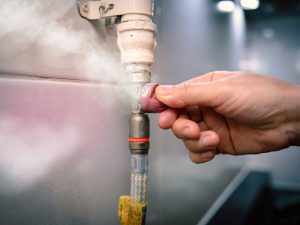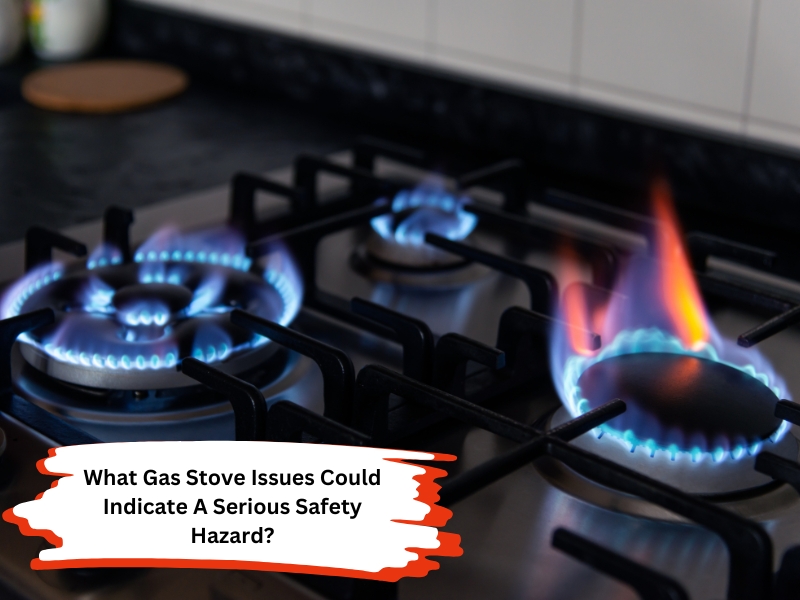Gas stoves are essential to most households, but they can pose significant safety risks when malfunctioning. If not addressed promptly, gas stove issues are often subtle but can quickly escalate into substantial hazards. Understanding the signs of potential safety concerns can help prevent disasters like gas leaks, fires, or explosions. This article will outline the gas stove issues you should watch out for and how they can indicate serious safety concerns.
How can gas stove leaks threaten your safety?
Gas leaks are one of the most common and dangerous issues with gas stoves. Even a tiny leak can lead to serious consequences, such as fire or an explosion. Here’s why gas stove leaks are so hazardous:
- Fire risk: Gas escaping from the stove can ignite if it comes into contact with a flame or spark, leading to a potential fire hazard.
- Health risks: Breathing in gas fumes can be harmful, causing symptoms like headaches, dizziness, nausea, and, in severe cases, unconsciousness.
- Environmental hazards: Gas leaks contribute to air pollution and harm the environment.
What signs of gas stove issues should you watch for?
Several tell-tale signs indicate your gas stove might be experiencing issues. If you notice any of the following, it’s time to take action:
- Yellow or orange flames: A properly functioning gas stove should have blue flames. Yellow or orange flames can indicate incomplete combustion, leading to a build-up of dangerous carbon monoxide.
- Gas odour: A distinctive smell of gas is a sign of a leak. If you smell gas, turn off the stove and ventilate the area immediately.
- Difficulty lighting the stove: If you’re having trouble igniting your gas stove, it could indicate issues with the ignition system or the gas supply.
- Gas hissing noise: A hissing sound from the stove could mean gas is leaking, which is a serious safety hazard.
Could a faulty ignition system lead to a fire hazard?
A faulty ignition system is more than just an inconvenience—it can also present a fire risk. Suppose the ignition system doesn’t work correctly. In that case, gas may flow without igniting, accumulating gas around the stove. Here’s why this is dangerous:
- Delayed ignition: If your stove takes longer than usual to light, there may be an issue with the ignition system.
- Sparking: Constant sparking without ignition could indicate an electrical issue with the ignition system.
- Failure to Ignite: If the ignition system isn’t working correctly, gas can leak out without igniting, potentially causing a dangerous situation.
- Gas accumulation: Any gas smell before the stove ignites suggests gas leaks without combustion, which is a fire hazard.

Suppose your ignition system isn’t working as it should. In that case, it’s best to immediately call a professional to inspect and repair the stove.
Why are unusual flames on a gas stove a sign of potential gas stove issues?
Flames on a gas stove are usually blue when the appliance functions correctly. If you notice any unusual colours or irregularities in the fire, it’s a sign that something isn’t right. Here’s what you should look out for:
- Yellow or orange flames indicate incomplete combustion, releasing harmful carbon monoxide.
- Flames that flicker or change height: Flickering or varying flame height may signal that the gas stove’s burner is clogged or that there is a gas supply problem.
- Extremely small or large flames: Small flames could indicate a blocked burner or low gas pressure. In contrast, large flames might indicate excessive gas flow, which could be hazardous.
If you notice abnormal flames, it’s crucial to have your gas stove checked by a professional.
How do gas stove issues affect the ventilation system?
Gas stoves require proper ventilation to ensure the safe release of combustion gases. When ventilation systems are compromised, it can lead to the accumulation of dangerous gases like carbon monoxide. Here’s how gas stove issues can affect your ventilation:
- Blocked vents: A clogged vent can prevent harmful gases from being expelled, causing them to build up in your home.
- Inefficient exhaust: If your stove’s exhaust fan is malfunctioning, it can result in poor air circulation, making it harder to remove combustion by-products from the kitchen.
- Excessive moisture: Inadequate ventilation can also increase humidity, creating an environment conducive to mould growth and damage to your kitchen’s structure.
Ensure your kitchen is adequately ventilated, and regularly maintain your stove’s exhaust system to reduce these risks.
Can a gas stove’s odour be an indication of a gas leak?
A gas smell is never something to ignore. If you detect a strong odour of gas in your kitchen or around your stove, it’s likely a sign of a gas leak. Here’s why a gas odour should raise immediate concern:
- Immediate danger: A gas leak is highly flammable and can lead to explosions, especially if the gas comes into contact with a spark.
- Health concerns: Exposure to gas can lead to serious health problems, including dizziness, headaches, and nausea. Long-term exposure can cause more severe issues, such as respiratory distress.

If you smell gas, turn off the stove, ventilate the area, and call a professional to inspect your system.
How do you recognise a stove that needs immediate repair?
Some gas stove issues require immediate attention. If you notice any of the following, it’s crucial to seek professional repair services without delay:
- Gas smell that won’t go away: If you can’t remove the gas smell, it indicates a leak that needs fixing immediately.
- Burner flames are yellow or orange: If they are discoloured and not blue, it’s time to check the stove.
- Unusual noises: If you hear hissing or popping noises when you use the stove, it could indicate a leak or internal component failure.
- Difficulty lighting burners: If your stove is too rugged to ignite or you notice a delay in lighting, you might have an ignition system problem that requires professional repair.
If any of these issues occur, stop using the stove and call a professional to repair it.
When should you seek professional help for gas stove issues?
Gas stove issues, especially those related to leaks or malfunctioning parts, should never be ignored. If you’re experiencing any of the following, it’s time to call a professional for help:
- Gas-related health symptoms: If you experience headaches, dizziness, or nausea, it could be a sign of carbon monoxide poisoning, and you should seek professional help immediately.
- Persistent gas smell: A gas leak is a significant safety hazard and requires immediate attention from a licensed gas fitter.
- Unusual flames or burner behaviour: A professional should examine any flame or burner performance abnormality.
- Difficulty lighting the stove: If the ignition system is not working correctly, you may need to repair or replace it.
Do not attempt to repair a gas stove yourself. Always contact a licensed professional to avoid further damage or safety risks.
Conclusion
Your gas stove is an essential kitchen appliance, but can also be a safety hazard if improperly maintained. Understanding the signs of potential issues—such as gas leaks, faulty ignition systems, and irregular flames—can help you identify problems before they become serious. Always seek assistance from professional gas stove repair services for any gas-related issues to ensure your safety and the safety of your home.
Prioritise Gas Stove Safety
Apex Gas Heater Service is here to help if you’re dealing with gas stove issues. We offer expert gas plumbing and gas heater repair services across Sydney. Whether you need repairs, installation, or maintenance, our skilled professionals ensure your safety. Contact Apex Gas Heater Service today.
Frequently Asked Questions
- How can I tell if my gas stove is burning efficiently?
A properly functioning gas stove will have blue flames. Yellow or orange flames indicate a problem and require attention. - What are the dangers of a poorly ventilated kitchen when using a gas stove?
Poor ventilation can lead to a buildup of harmful gases like carbon monoxide, posing serious health risks. - Is it safe to use a gas stove if I have a gas leak?
Never use a gas stove if you suspect a leak. Turn off the gas, ventilate the area, and call a professional immediately. - How can I prevent gas stove-related accidents in my home?
Regular maintenance, proper ventilation, and prompt attention to unusual signs are key to preventing accidents. - What should I do if my gas stove makes a popping or clicking noise?
Unusual noises can indicate a problem, and you should consult a professional to determine the cause and necessary repairs. - Are certain types of cookware safer for gas stoves?
While most cookware works on gas stoves, ensure your pots and pans have flat bottoms for even heating and stability. - How can I keep my gas stove burners clean?
Clean burners regularly with warm, soapy water and a non-abrasive sponge. Ensure they’re cool and the gas supply is off. - Can a gas stove be a fire hazard even if it’s not leaking gas?
Issues like faulty ignition systems or unattended cooking can also lead to fires, emphasising the potential dangers of using gas appliances. Regular maintenance and careful attention can help reduce these risks. - What are the long-term health effects of exposure to gas stove emissions? Long-term exposure to gas stove emissions, including nitrogen dioxide, can contribute to respiratory problems.
- How do I know if a gas stove repair person is qualified?
Ensure the technician is licensed and experienced in working with gas appliances. Ask for credentials and check reviews if possible.

